I started this blog in 2017 (okay, technically it was the end of 2016) as a three-year experiment. I planned to spend 2017, 2018, and 2019 with a very focused goal in mind–to double our net worth and become location independent. In an absolutely shocking turn of events, our family became location independent last year, mid-way through the experiment.
Our location independence looks a little different than I envisioned, but it’s been a great decision for our family. We live in one place, in an idyllic small town in North Carolina just north of Charlotte. Mr. ThreeYear and I both work remotely. Our kids attend the great public schools here, and we travel as much as we can during breaks and summer. Most importantly, we are close to our family and the weather is a lot warmer.
Now that we’ve reached one goal (and it was, truly, the main goal), where does that leave us in 2019? Of course, we still have to double our net worth, and unfortunately we have almost 50% more to go, due to losing equity in our house and a market downturn at the end of last year.
But, because we know that we’ll eventually reach that goal, and it’s not quite as pressing now as it was when we thought we’d be leaving our jobs for several years, what should be our focus in 2019?
Each year of the experiment, I’ve picked a theme, a “word of the year,” before it was a thing.
In 2017, I picked one new habit each month to get better at, so we could improve our productivity with investing and earning.
In 2018, I focused on spending 20% less, each and every month, at the grocery store, so we could save more.
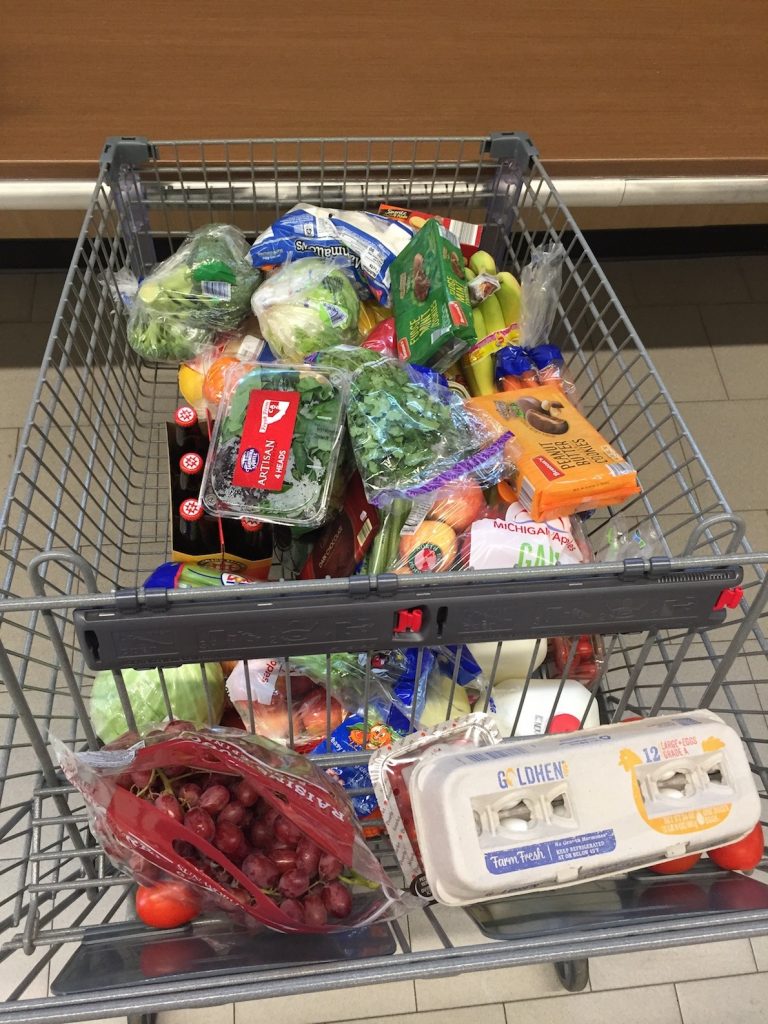
In 2019, I thought about a lot of behaviors we could focus on. We want better relationships, better health. But we still struggle with over-spending, too. And our spending experiments have worked pretty well to change our behavior.
So 2019 is the year for money experiments.
Each month, we’ll perform a different money experiment to see how we do.
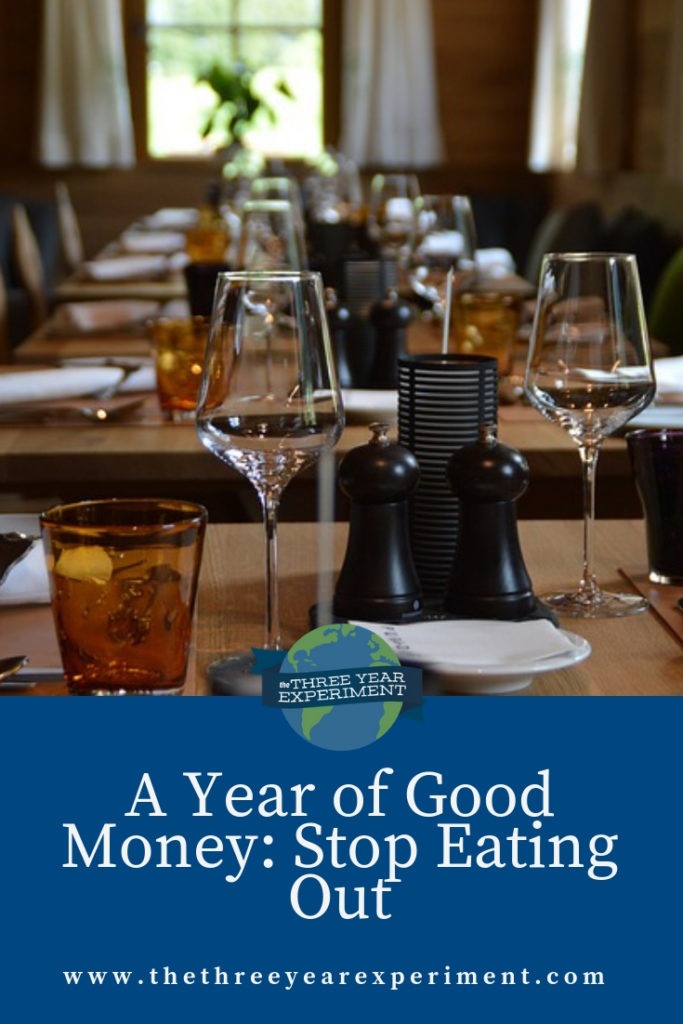
What type of money experiments? Well, anything that will help us spend less or save more.
We’re really focused more on spending behavior this year than earning behavior, so all the experiments will focus on the demand side of the equation, i.e., the money going out of our bank accounts.
If you have any money experiments you’d like to see us undertake this year, please suggest them in the comments! I’d love any and all ideas!
Our first money experiment is going to be in an area that I’ve long felt a little guilty about–Eating Out.
While we love to eat out, I find that many times, we waste money on the experience. We’ll order takeout that isn’t very good, eat at a Mexican restaurant yet again, so that it doesn’t feel special, or grab some lunch just because we’re out and we’re hungry.
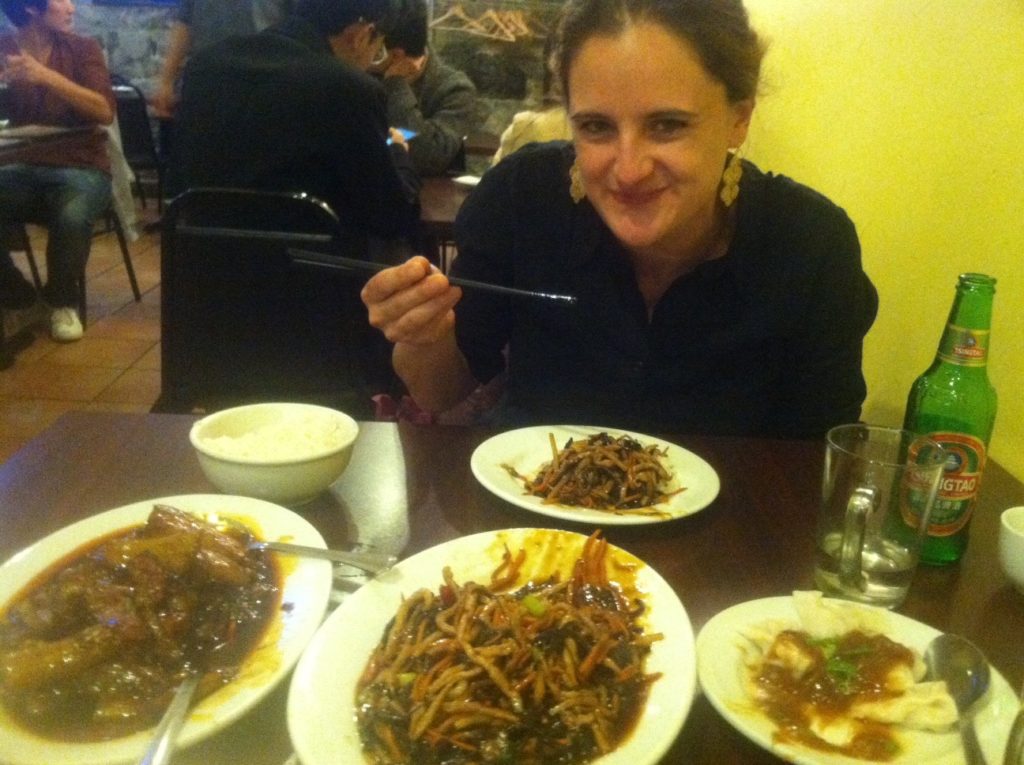
Our restaurant meals don’t always feel planned and special, and I’d like that to change.
Over the past five years, these have been our monthly eating out averages:
- 2014: $238 per month
- 2015: $302 per month
- 2016: $213 per month
- 2017: $274 per month
- 2018: $265 per month
As you can see, we’ve averaged well over $200 per month and sometimes over $300 per month eating out. That is a lot of money. In five years, our total spent eating out has been $15,504! Whoa, that’s almost a year of college for one of the boys.
We don’t want to completely eliminate eating out from our budget, but we’d definitely like to decrease the amount of money we spend eating out to well under $200. Ideally, we’d spend $100-$150 each month in eating out. We’d also like to save our eating out dollars to enjoy delicious food, not just “grab on the go” or “we’re too tired to cook” food.
So how do we become more thoughtful about eating out? Well, we obviously have to change our spending behavior. And to do that, we have to go back to the Cue-Behavior-Reward habit cycle that I talked a lot about in 2017.
How to Change Your Habits
In The Power of Habit: Why We Do What We Do In Life and Business, Charles Duhigg explains how habits are formed. Because our brains are the body’s biggest energy suck and use around 20% of the body’s available energy, they need to work as efficiently as possible. That’s why they try to automatize everything we do. Think about the first time you drive home from work to your new house. It’s so hard! You have to consciously navigate the unfamiliar route. After a week or two of making the drive, though, you don’t think about the turns. You navigate on autopilot while planning your dinner menu, recapping the conversation with your colleague, or deciding what to do this weekend.
Duhigg explains that everything in our lives is like this, even if we don’t realize it. If we habitually hit the “Snooze” button six times a morning, that’s a habit, whether we’ve meant for it to be or not. The more we engage in a repetitive behavior, the more deeply engrained that behavior becomes in our brain and the harder it is to change.
Duhigg teaches that replacing bad habits with good ones doesn’t eliminate our old cravings. Our brains consistently produce the hormones that make us want to engage in unhealthy behavior like overeating, drinking too much, or smoking.
But when we engage in new habits, day after day after day, then we create “behavioral inhibition and self-discipline” that eventually override those old urges and allow us to bypass them with healthier behavior. We learn to trick our brains.
Our brains use a cycle of Cue, Routine, and Reward in our habits.
Let’s say your alarm clock rings, you look over and see your Ipad sitting on your night table. In the past, hearing the alarm and seeing your Ipad is your visual and auditory cue to hit the “Snooze” button.
But, if you change your cue by moving your Ipad to the hall (where you can still hear your alarm but will have to get up to turn it off), then your routine will be easier to change, too.
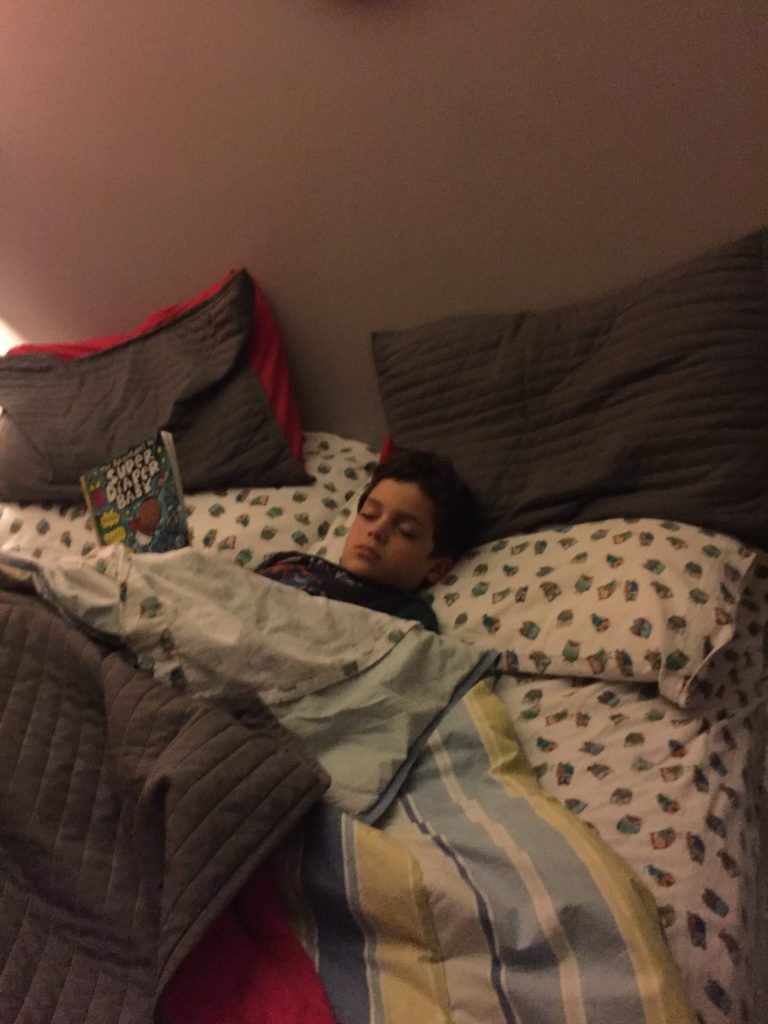
You’ll have to get out of bed to hit the snooze button, dramatically decreasing the chances of doing that.
If you couple your new behavior with an incentive to stay out of bed, a reward, you’ll really jump start your progress. The reward is something that should give your brain an endorphin rush, so that tomorrow, it will be motivated to stick with the new behavior.
Right now, your endorphin rush comes from sleeping 8 more minutes, 6 times in a row. But if you set up the coffee pot the night before, then you can grab your Ipad, punch “Stop,” and follow your nose to the kitchen where a delicious, hot brew is waiting for you.
January’s Experiment
To change these cycles and re-examine our relationship with eating out, we’re going to cut all restaurants out during the month of January. I had a talk with the family, and they’re (grudgingly) on board with this challenge. While it’s not fun, it’s only 30 days, so they have agreed to do their part.
Since it’s already January 16th, we’ve experienced two weeks of no eating out. So far, it hasn’t really been that difficult. There was one time when we wanted to stop by the food truck on our way back from shopping (Cue) and we had to wait to eat until we got home (Behavior), but that moment passed in about a minute, and we were fine (Reward–we didn’t spend any money).

It’s been harder to say no when friends invite us to eat out with them. Luckily, each time we’ve been asked we’ve had excuses–school was getting out early so no lunch, and Junior ThreeYear had climbing on Friday evening. We could simply tell our friends about the challenge, and we will, but since we couldn’t go anyway, we left it for another time.
Changing Our Cues
In order to encourage our family to eat in more, which is the direct correlation of eating out less:
- We’ve bought a few more treats this month–sweet items from the bakery, steak, and prepared foods like pizza and hot dogs.
- I’ve cooked more, and also cooked extras, so we have a supply of things like Banana Bread muffins and homemade bread lying around to snack on.
- I’ve also added plenty of kid favorites to the menu, like hot dogs and macaroni and cheese (the box kind, of course).
- On Saturdays, I’ve been making a big lunch early in the day, and then at night we have leftovers or something easy. This simple hack has worked well so far, because Saturday lunch tends to be our biggest weak spot for eating out, so if I have something delicious made, we’re not as tempted.
As usual, I’ll report back next month on how we did with this experiment, and how much we saved. We haven’t decided where this “saved” money should go, but I think that putting it in a travel fund is a very good idea, given our lack of any travel plans in the foreseeable future.
Please let me know what money experiments you’d like to see us try this year in the comments!

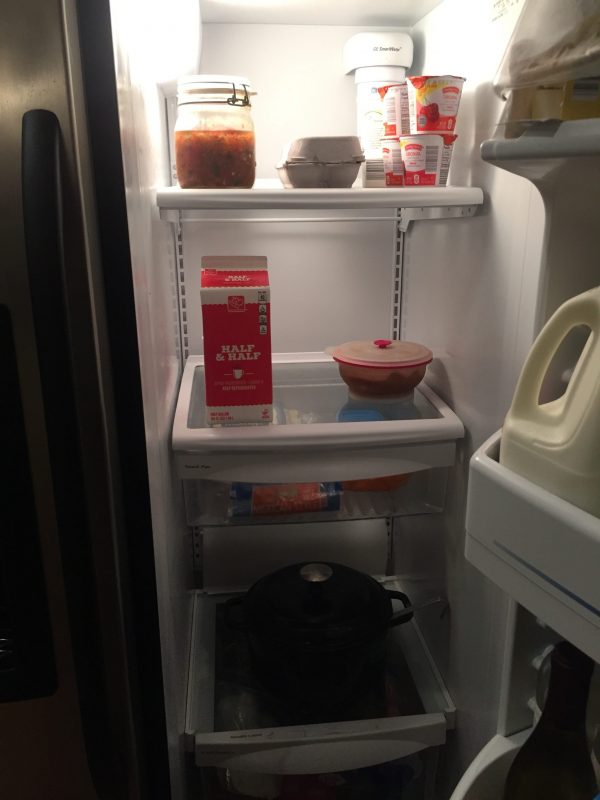

Have you ever tried to limit the amount of money you spend on gas? It’s definitely a Mr. Money Mustache thing, but I do try to strategically plan my errands and sort of map it out to not make wasted extra trips. Or, take the bike like him.
OOh… I like it! Honestly, no we never have. We just use what we use, and that’s it. I think that one will definitely make the cut. We can’t really bike to the grocery store, but we could use grocery delivery and just drastically limit everything else one month. Thanks for the great tip!
Spending money on dining out is truly my frugal Achilles’ heel.
Agreed. So hard to stop.
My goal is to almost eliminate the money we spend on mindless takeout! Planned/fun food out is fine; my problem is with mindless takeout that we grabbed because we didn’t have a dinner plan and it got late. We’ve been making really good progress on that!
YES!!!!!
My monthly average for dining out in 2018 was $316.20 … for one person! That is painful to admit. While I do find great joy in good food, there are definitely times when I’m not spending consciously (yet another diet soda for $2.50, anyone?) I also travel for business a fair amount (50-75 nights a year), but I could do better about reducing expenses there too.
Admittedly, when I really started attempting to ratchet down spending later in the year, it decreased a bit. Average from September – December 2018 was $302.77
I think my goal will be to average <$260/month in 2019. Seems like an achievable goal!
If your community has a "Buy Nothing" group on Facebook, it might be a fun experiment to see if you could borrow a large item vs. purchasing! I've seen folks borrow pressure watchers, miter saws, ladders, kayaks, etc. Could be a way to reduce a larger expense from something you won't use much. Maybe good for a summer month or holiday event?
*pressure washer … the typo monster got me.
Oh that’s a great idea Hannah! We actually don’t have a Buy Nothing Group and I’m debating being a co-administrator with another friend. I’m afraid it’ll be too much work but maybe this would be the push I need. You know, I love your goal of cutting your spending by $50-$60 a month! We found with the grocery spending that it made a huge difference to have an achievable goal. Because we did it, and now we’re like, “oh yeah, we achieve the goals we set.” Versus saying, “I’m going to spend $10 a month on eating out from here on out!” Lol.
Oh god, this sounds like a nightmare to me!!!! You’re so brave to try. I think pre-2016 we spent $500/month on dining out for just 2 people (me and hubby), those were the days! We have been keeping it down $300 now 🙂 hard to imagine anything lower especially with growing boys!
Haha I know it’s a tough one but lately, we’ve been unimpressed by the times we’ve eaten out so it makes it easier. It looks like you have cheaper, more delicious options near you than we do! And oh my gosh I can’t even imagine how big our eat-out budget was, pre-kids, pre-financial “enlightenment!” 🙂
As a professional “eater-in” I’ll be watching your progress closely Laurie!
I think we only ate out 3 or 4 times in 2018, and I hope to do even better in 2019!
Thanks Mr. Tako. You are definitely one of my biggest inspirations in this area!
In our short travels thus far we’ve already found that when it comes to sticking to a food budget, some places are easier than others.
We left Atlanta – a restaurant heaven with weak grocery store game – and discovered H.E.B. in Texas. Their options for healthy, tasty, prepared or heat and eat meals are phenomenal. Grocery prices overall there seem comparable to a Walmart – with *much* better quality.
We’re travelling, not settling in TX, but I’ve gotta say I’m sure going to miss H.E.B. when we leave. They make it easy to avoid mediocre, unhealthy restaurant meals.
we do very well at not eating out. mrs. smidlap does it with the girls without me occasionally. i could probably stand to do a little more this year like a date night to keep the magic rolling, as they say. one thing that keeps us from doing it more has been a couple of major dining disappointments last year. we went to very nice places for our anniversary in october and treated 2 friends at christmas. both meals cost a fortune, like in the 100’s, and were both disappointing. the next couple of times might be more modest places where even if they suck the money will be less.
good luck with the goals, nice lady.
That’s great. We had some take-out disappointments and have used that experience to call nix on future take-out. Those bad memories are great fuel for not spending. Date nights–every time I take one I think, “we should do this more often.” Even if it’s just a movie and dinner is popcorn and candy.